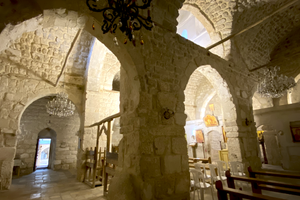If you were present on the Mount of Beatitudes at the original telling of the Lord’s Prayer, you would have heard the historical Jesus begin his sermon with the Aramaic words “Abwoon d’bwashmaya…”
Translated literally as a blend of “our father” (Abba) and “womb” (woon), the most sacred of Christian prayers starts with an acknowledgment of both the masculine and the feminine natures of divinity.
In the high, desolate hills of Maaloula, Syria, you can still hear these untranslated words of Jesus echo through the halls of the holy places, spoken in his native vernacular by modern denizens.
Maaloula and its neighboring villages of Jubb’adin and Bakh’a are the last places on Earth where Aramaic, the language spoken by Jesus, his disciples, and untold ancients, is still recognized as the common tongue.
The name of the town itself is Aramaic for “entrance” and is based on a longstanding legend. Saint Thecla, a young disciple of Saint Paul, fled her home in Turkey to escape her pagan parents, who did not approve of her Christianity. When she arrived in Maaloula, she reached an impassable mountain. The legend says that her prayers caused the mountain rocks to divide into a valley, and, as she walked through to the other side, a stream began to run beneath her feet.
While the town alone is certainly a worthy destination, the Convent of Saint Thecla (also known as Monastero Saint Takla) and the Convent of Saints Sergius and Baachus are the real stars, and local historians will gladly recite the Lord’s Prayer in Aramaic for visitors.
Today, Maaloula is an isolated village largely removed from the present, where saints once walked among humanity. And where the words of the divine are still used regularly to order a draught of wine, the local production of which is nearly as old as the language itself.


